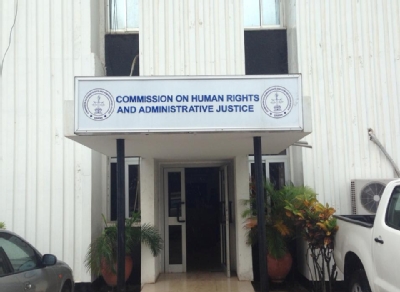CHRAJ Deputy Commissioner, Richard A. Quayson, has urged Ghanaians to move away from just talks about corruption and take action to eradicate the canker.
“We must all collectively move away from the talk, talk and act on issues of corruption, we must report incidents of corruption from our workplaces, our communities, and within the public establishment,” he said.
Mr Quayson said the Commission on Human Rights and Administrative Justice’s (CHRAJ) doors were open for people to report corrupt practices at the workplace or any public institution.
He said CHRAJ would protect the identity of the individual and conduct its investigations to ascertain the truth.
“It is only when we all open our eyes wide and other senses against corrupt practices that we can fight it,” he said.
Mr Quayson stated this at the 17th Monthly Stakeholders Engagement seminar organized by the Ghana News Agency's Tema Regional Office.
The event aimed to provide a platform for both state and non-state organizations to address national issues to enhance development.
Speaking on the topic: “Is the fight against corruption a mirage or reality, the perspective of CHRAJ,” Mr Quayson said it was time to take collective and sustained action to combat corruption.
The CHRAJ Deputy Commissioner also said amid the growing perceptions of corruption, the public had become increasingly cynical about official commitment to effectively tackle the menace.
“Confidence in the integrity of public office is fast eroding due to inadequate appreciation of the complex mix of factors implicated in corruption; lack of public participation in the development and implementation of the anti-corruption measures; and failure to foster local ownership in the formulation and implementation of the various strategies.
“Lack of effective and sustained coordination in the implementation of anti-corruption measures; and lackadaisical government commitment to, and limited support for, the implementation of anti-corruption strategies,” he noted.
Mr Quayson added that corruption in Ghana was largely nurtured and influenced by the patrimonial character of the society where informal relations, family connections and social reciprocity are reflected in levels of favouritism, cronyism and nepotism.
“The patronage system also fundamentally influences the formal system and creates contradictions between how institutions are intended to operate in principle and how informal practices supplant formal structures in reality.
“As a result, public administration and political competition often appear to be driven more by personal ties than formal rules”.
Mr Francis Ameyibor, GNA Tema Regional Manager, suggested that Civil Society Organisations (CSOs), religious bodies, professional groups, traditional authorities, gender-based groups and other interest groups must stand up and fight the corruption menace.
Latest Stories
-
Chief of Staff urges youth to prioritise social security beyond the payslip
1 hour -
Trump sets new deadline of 10 or 12 days for Russia to act on Ukraine
2 hours -
US airlines oppose new limits on facial recognition at airport checkpoints
2 hours -
US to allow federal workers to promote religion in workplaces
2 hours -
Rare 4,000-year-old Egyptian handprint found
2 hours -
Five killed in Bangkok market mass shooting
2 hours -
Lionesses welcomed home by jubilant fans after Euro 2025 win
3 hours -
Newcastle open talks to sign Southampton’s Ramsdale
3 hours -
Everton bid for Aznou but need six more players – Moyes
3 hours -
Bishop Dr. Ezekiel Goodman Kofi Anim
4 hours -
Don’t just report irregularities, tell us the recoveries – Oduro Osae fires Auditor-General
5 hours -
A-G’s report: Something is fundamentally wrong with our public financial system – Dr Oduro Osae
5 hours -
10 fascinating facts about music icon Daddy Lumba and his legacy
6 hours -
How Daddy Lumba got his stage name
6 hours -
It has been difficult to accept this sad news – Nana Acheampong on Daddy Lumba’s death
6 hours

